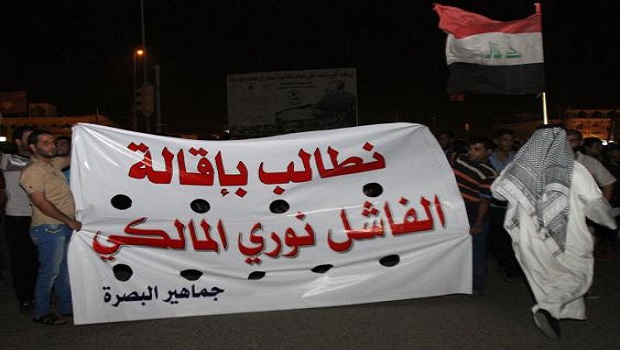
Protesters chant anti-Iraqi government slogans during a protest in Basra, Iraq’s second-largest city, 340 miles (550 kilometers) southeast of Baghdad, Iraq, on Wednesday, July 24, 2013. (AP Photo/Nabil al-Jurani)
He also criticized his deputies, Saleh Al-Mutlaq and Hussein Al-Shahristani, and a number of ministers.
In an interview on the pro-government Al-Iraqiyah TV, Maliki refused to accept responsibility for the government’s economic and security failures. He blamed government officials, including “my friend and ally” Hussein Al-Shahristani, for supplying him with erroneous information on problems in the country, including the lack of electricity supply.
Maliki also sought to deflect blame for Iraq’s security problems, denying that the government supported Shi’ite militias, whom he accused of committing crimes and operating without authority from the state.
In addition, Maliki criticized the Sadr Movemnet, pointing to a recent incident where Sadr militias attacked coffee shops in Baghdad in clashes which claimed two lives.
The prime minister asked: “Who gave you permission to go to the coffee shops if they broke the law?” He added that “there is a government in place—so who do you think you are to represent the government, legitimacy and the nation?”
The Iraqi prime minister also said: “The quota system based on religious sects has caused chaos in all state institutions,” declaring that he will enter the next elections with an independent list that will include professional politicians.
Mouayad Tayyib, spokesman for the Kurdistan Alliance bloc in the Iraqi parliament, told Asharq Al-Awsat that “the political situation was expected to deteriorate, especially after the fall-out between Nuri Al-Maliki and Moqtada Al-Sadr, and the exchange of accusations between the two. Worse still is the recent confrontation between Al-Maliki and his deputy, Hussein Al-Shahristani, which threatens to break the strong ties between the two.”
Meanwhile, the attacks on Abu Ghraib and Al-Hout prisons in Baghdad have caused concern in Washington, not only because a large number of senior Al-Qaeda operatives escaped, but also due to the evidence it provided of the growing ability of Al-Qaeda to launch such attacks.
The New York Times quoted a senior US Department of State official, speaking on condition of anonymity, as saying: “We are concerned about the increased frequency and complexity of Al-Qaeda operations in Iraq.”
The Islamic State in Iraq and Syria (ISIS) organization, which is affiliated to Al-Qaeda, has claimed responsibility for the Sunday attacks on Abu Ghraib and Al-Taji prisons. The organization announced that “hundreds of Muslim detainees, among them some 500 of the best fighters ever born, were freed.”
